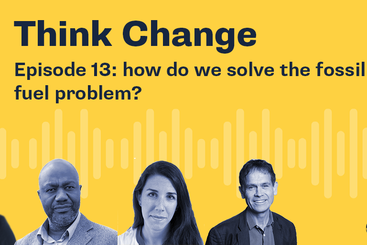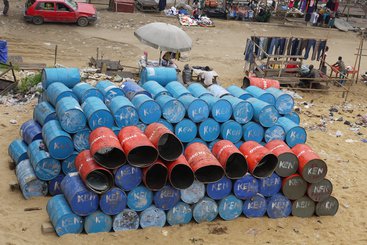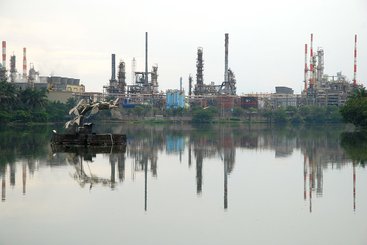With the fifth-ever Africa COP taking place in Egypt over the next two weeks, Nigeria has a major opportunity to show leadership on climate action by accelerating its clean energy transition, while also meeting key development goals.
The government has made strong climate pledges, including announcing a 2060 net-zero emissions target and passing the Climate Change Act, which commits the federal government to ambitious plans on climate action.
But decades-long and deeply entrenched challenges have hindered Nigeria’s progress towards a sustainable and prosperous path. The 2020s have been designated the ‘decade of gas’ by the President, and the long-awaited Petroleum Industry Bill, signed into law in August 2021 as the Petroleum Industry Act, creates new incentives to explore oil in inland basins, outside the traditional oil and gas region of the Niger Delta. It includes relatively limited penalties for continued flaring of gas, whilst positioning the Nigerian National Petroleum Corporation Limited (NNPC) to maximise economic opportunities in the sector. Government policies continue to incentivise rather than penalise reliance on the oil and gas industry, and levels of subsidies for production and consumption of fossil fuels remain high. The country is also grappling with significant development challenges, including improving energy access and the provision of healthcare, basic services and infrastructure.
Below, we outline five key developments that can bolster a clean and just energy transition in Nigeria.
The Climate Change Act and the Energy Transition Plan provide an unprecedented opportunity for bold action (Chukwumerije Okereke)
Nigeria’s Climate Change Act, signed into law last November, provides the legal framework and a bold institutional arrangement for action on climate change. The Act establishes a National Council on Climate Change, chaired by the President, to lead work under the Act and help mainstream climate change action into the country’s development agenda. The Council has a strategic role coordinating the various ministries, departments and agencies critical to implementing the deep decarbonisation measures required. This is a key piece that has been missing along Nigeria’s climate journey. The Act also establishes a Climate Change Fund to support investment in clean energy, and provides impetus for the establishment of a carbon tax system to encourage a green transition. Meanwhile, the launch of the country’s Energy Transition Plan last August aims to ‘achieve in Africa’s largest economy, one of the world’s first true just transitions’. These two major steps, alongside an ambitious revised Nationally Determined Contribution (NDC), provide the utmost and credible signal of the future Nigeria. Turning these high-level commitments into practical action, however, remains a major challenge.
Implementation of the Climate Change Act has begun with the inauguration of the Council and the appointment of a Director General. This will provide renewed impetus to enhance coordination among the relevant ministries and arms of government and between the federal and sub-national governments, helping to ensure that climate change is mainstreamed into all sectors of the economy, including agriculture, industry, energy and transport, and at all levels of government.
The vital next step is for the Council to publish Nigeria’s first carbon budget as requested by law and put in place efforts to monitor implementation and compliance. Equally important is the need to develop and implement concrete plans to scale up investment in green infrastructure to reduce emissions and enhance climate resilience.
Multinational oil and gas companies no longer have a free pass to hinder the clean energy transition (Kathryn Nwajiaku-Dahou)
Time’s up for multinational oil companies, whose operations have for decades have exploited natural resources in countries like Nigeria with total disregard for local populations.
Today, companies around the world are being openly challenged in the courts for their lack of consultation with communities and the systematic environmental destruction their activities have wrought on lives and livelihoods in and around oil and gas infrastructure.
They are also under closer scrutiny for not taking climate change seriously. Social movements and NGOs are taking them to court (and winning), and these companies are being asked to pay for the damage they’ve caused. Initiatives such as the Bayelsa State Oil & Environmental Commission forefront the need for accountability for international oil companies (IOCs) and just compensation for past damage to environments and communities, and clean-up and restoration investments to facilitate a transition away from fossil fuels.
Notwithstanding the immediate cost of gas flaring to communities in the Niger Delta, overall Nigeria has one of the lowest levels of domestic CO2 emissions in the world. The Production Gap Report ranked it 18th among countries with the highest extraction-based CO2 emissions because fossil fuels exported from Nigeria are burned elsewhere, while Nigeria’s NDC targets focus only on domestic emissions. These figures highlight entrenched patterns of injustice and how Nigeria’s resources have benefited the rest of the world rather than its own population. A just compensatory regime, centred around the clean energy transition, which seeks to address this asymmetry is vital.
Holding international oil companies to account for their climate footprint is critical for Nigeria and the world’s climate transition. This is particularly urgent at a time when IOCs are poised to take advantage of current high prices and increase production to further maximise profits.
Repurposing inefficient fossil fuel subsidies to fossil fuel producers could generate some of the finance needed to expand access to a just energy transition. This would enable Nigeria to stand up to international oil company interests at a time when the world desperately needs to wind down fossil fuel production and meet decarbonisation targets.
High oil prices have not been to Nigeria’s advantage (Oluwasola Omoju)
The energy crisis following Russia’s invasion of Ukraine, the consequent sanctions on Russia and Russian reprisals have triggered a significant increase in oil prices, which exceeded $110 per barrel in March 2022, and remain high. Some countries saw major profits – Saudi Arabia made about $50 billion in the second quarter of 2022, primarily due to high oil prices. However, this has not been the case for Nigeria.
Despite the oil and gas sector being a mainstay of the Nigerian economy, with revenue from oil and gas sources accounting for about 60% of total federally collected revenue between 2010 and 2021, Nigeria has not benefited from the current high oil price. Thanks to unchecked oil theft and infrastructure vandalism crude oil production has plunged to below a million barrels a day, with Angola and Libya surpassing Nigeria as the largest producer in Africa.
High oil prices increase fuel subsidy costs and reduce the revenue available for social welfare systems and physical infrastructure. This year, the government will spend an estimated N4 trillion ($9.3 billion) on fuel subsidies, almost 10 times higher than the N443 billion ($1 billion) initially projected and equivalent to 23% of the 2022 budget, exceeding total spending on health and education combined.
The current high price looks tempting for oil- and gas-producing countries. But it is temporary and unlikely to benefit Nigeria without key reforms such as subsidy removal. Moreover, many countries are speeding up their clean energy transition plans in the aftermath of the current energy crisis, which will compromise future demand for Nigeria’s oil and gas. Basing future oil and gas investments and production on the current price will lock Nigeria into a carbon-intensive future without significant economic benefits.
The international community can support decisive and sustained subsidy reform (Ipek Gençsü)
One of the major obstacles to Nigeria’s transition away from reliance on fossil fuels is the high levels of government subsidies for their production and consumption.
Progress on reforming fossil fuel subsidies has been extremely challenging, as consumers expect accessible energy and affordable pricing from their government as a benefit of being a major oil producer. As in many other countries, from France to Ecuador to Kazakhstan, attempts to raise prices are met with a strong public backlash. Fossil fuels remain a key source of government revenue, and the power and influence of certain interest groups restrict opportunities for reform.
As we argue in our latest report, a credible programme to rebuild the broken social contract is needed whereby the government can meet its promises to deliver on social and development priorities, while in parallel carefully removing fuel subsidies. Sufficient budget must be allocated to finance these ends, and administrative and bureaucratic hurdles have to be overcome.
Development finance institutions and other donors, wealthier, high-emitting countries, and international NGOs are well-placed to support this agenda through financing and research, and by encouraging constructive engagement around subsidy reform and justice and social responsibility in energy transition more broadly. These institutions can also support analysis and planning on how best to sequence subsidy reform and a just energy transition, engage different concerned parties to secure their support, and provide monitoring and consistency through election cycles and different governments. They can support the government in managing what citizens expect to bear as a result of subsidy reforms.
The lack of messaging and communication around subsidy reform has been a major shortfall. Relevant stakeholders can help raise awareness and stimulate broad support, with straightforward messaging about how subsidies could be used more effectively, whether for social protection or public services, or to provide cheaper, cleaner energy than Nigeria’s many diesel generators.
There is growing international support for a just transition for consumers, communities and workers alike (Ginette Walls)
As our report notes, repurposing fossil fuel subsidies can support Nigeria’s development endeavours and climate goals. However, these funds alone would not be enough to fully realise these goals, and international financial support will be necessary. Richer countries with more capacity to transition and more responsibility for historic emissions should phase out their oil and gas production sooner than countries without the same capacity and historic responsibility, and support the efforts of other countries to transition in ways that are just and equitable.
To implement the recently approved Energy Transition Plan, Nigeria is seeking $10 billion in financial commitments ahead of COP27. Last year South Africa signed a Just Energy Transition Partnership (JETP) at COP26, where several governments, including the UK and the US, as well as the European Union (EU), pledged $8.5 billion to support South Africa’s just transition efforts. As negotiations continue, questions remain as to how the funds will be distributed, and how much of a focus there will be on equitable and fair support for the workers and communities affected. These questions are key as other countries pursue JETPs of their own.
A similar funding commitment to Nigeria, coupled with funds repurposed away from fossil fuel subsidies, could propel the country’s just energy transition in two ways:
1. Critical support for impacted workers and communities
While direct employment in the oil and gas industry accounts for less than 1% of Nigeria’s total employment, the sector provides many indirect jobs across transport, equipment, construction and services. Moving away from fossil fuels will necessitate careful, proactive planning that puts affected workers and communities at the centre.
2. Pursuing economic diversification
In 2020, Nigeria was ranked 129th out of 133 countries in terms of the complexity and diversity of exports. That year, fuel exports, including oil and gas, accounted for 88.7% of the country’s merchandise exports. Repurposed subsidies paired with financial and technical support from higher-income countries can help diversify Nigeria’s economy. Options including investing in renewable energy capacity and clean energy manufacturing would provide jobs and contribute to meeting Nigeria’s energy access goals.







